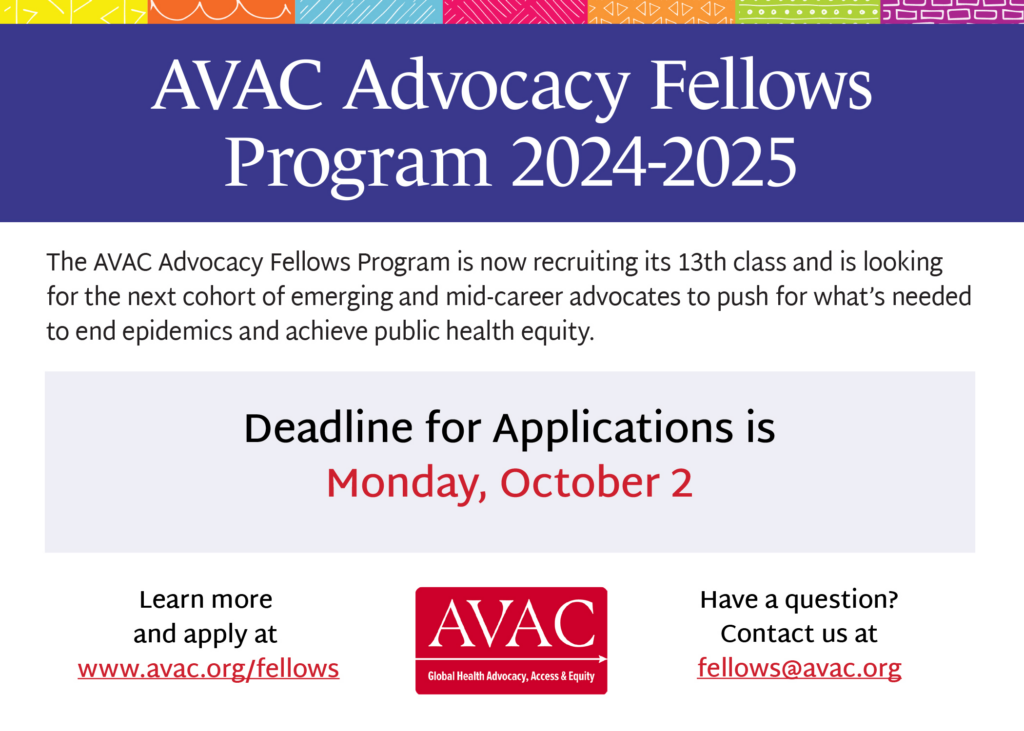Application Deadline: 2 October 2023
AVAC is thrilled to invite applications for the 2024 Advocacy Fellows Program. Fellows accepted into the program, will mark the 13th cohort of this program. Read further to explore the history of the program, learn about new features for 2024, find application details, and register for upcoming informational sessions.
Download Application Materials Here. Application deadline: 2 October 2023
About AVAC’s Advocacy Fellows Program
Achieving successful HIV prevention relies on programs and research shaped by communities and grounded by their needs and priorities. Skilled and informed community advocates drive this process. AVAC’s Advocacy Fellows Program expands and strengthens the capacity of civil society advocates and organizations to monitor, support and help shape HIV prevention research and rapid rollout of new effective interventions in low- and middle-income countries facing substantial HIV burdens.
The program provides intensive support to emerging and mid-career advocates to execute advocacy projects addressing locally identified gaps and priorities. Fellows receive comprehensive training, financial backing, and technical assistance to strategize and execute a targeted 18-month project hosted by an organization within their country.
In its 15-year history, 85 Fellows and 75 partner organizations across 15 countries have participated in the program. They have influenced policy, championed community perspectives, strengthened healthcare systems, demystified HIV prevention research, advocated for fairness and transparency on local, regional, and global scales and now lead many national and regional organizations. Discover more about the program’s impact here. As the 2022 Fellows conclude their Fellowships, learn more about their projects and achievements here.
What’s New in 2024
While HIV biomedical prevention advocacy remains central, we encourage projects with a strong focus on health equity, structural considerations, and links to TB, STIs, and sexual and reproductive health and rights. Advocacy projects related to pandemic prevention, preparedness and response are also welcomed.
Eligibility
- Emerging or mid-career community leaders and advocates who want to advance their advocacy skills and advocate for HIV, SRHR, STI, TB, and pandemic prevention and preparedness.
- Individuals with experience or education in HIV or public health, or in advocacy for key populations (e.g., sex workers, LGBTQIA+ individuals, pregnant individuals, people who use drugs) or for social and economic justice.
- Based in low- and middle-income countries with substantial HIV burdens and ongoing HIV prevention research or introduction of new interventions.
- Please note that for 2024 fellowships, priority focus lies in Eastern and Southern Africa.
Proficient in written and spoken English.
Application Process
- Download application materials here.
- Join one of two informational conference calls to learn more about the program. Visit www.timeanddate.com to confirm the time in your timezone):
- 1 Sept – 3pm CAT /4pm EAT, register here
- 18 Sept – 3pm CAT /4pm EAT, register here
- Applications are due by 2 October 2023.
Learn More
- View AVAC Alumni Fellows here and learn what Alumni Fellows are up to now after completing the program.
- View video reflections from Alumni Fellows both here and here.
- Access the 2024 Advocacy Fellows Information Packet and materials.
- Explore AVAC’s Fellows page for more information about the program and the Fellows network.
- Contact the team at [email protected].
Applications are due by 2 October 2023, and 2024 Fellowships will run from April 2024 through September 2025.
Spread the Word
Help us reach potential advocates by sharing this information within your networks.

We look forward to receiving your application and making a positive impact together.
